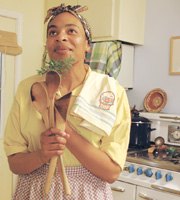home | metro silicon valley index | the arts | stage | review

Photograph by Dave Lepori
Spoonerisms: Gladys (Karen Aldridge) shows off the tools of her trade in 'The Cook.'
Food for Thought
Teatro Visión's 'The Cook' simmers across four decades of Cuban history
By Marianne Messina
THE NEW production by Teatro Visión, The Cook, spans 40 years of Castro's revolution, but it is focused on a cook named Gladys (Karen Aldridge), because as the revolution waxes and wanes around her, Gladys remains centered. "I know who I am. I am a cook," she declares early on. The three acts capture snapshots of three phases of the revolution: its opening salvo; its crackdown period, when homosexuals like Gladys' cousin, Julio (José Manuel Martinez), were imprisoned; and beginning in the '90s, its on-again-off-again flirtation with capitalism.
We see these phases reflected in Gladys' life and her marriage to Carlos (played superbly, down to the gait and mannerisms, by native Cubano, Gendell Hernández). Through cooking, Gladys lands a job running the kitchen of the wealthy Adria (Carla Pantoja) and thus secures jobs in the household for her cousins and her husband (though Carlos prefers eating and railing on the wealthy to serving). In one scene that brought the audience to laughter, the Cuban music comes up, and as Gladys and family chop vegetables behind the table, we see hips swaying and bodies writhing to the music.
Set designer Ron Gasparinetti has cast the sprawling kitchen in warm colors, pink accented by burgundy, both utilitarian and beautiful with its tiled floor, its arched doorway capped in wrought iron leading onto a verdant veranda. As a result, not only does the action take place in a warm, bright environment Gladys would understandably love, but the kitchen shows the wealth of the family and the fact that the kitchen is the servants' domain all at once.
During the revolution's heyday, Gladys carries on her cooking, while her husband, a big shot in Castro's government, carries on with other women. Years later, when a smidgen of capitalism trickles into the country, Gladys uses her cooking to help her family (a reconfigured family that includes the daughter of Carlos' mistress) prosper again. Carlos has come full circle to working under her again in the kitchen as they run the successful family paladar (a restaurant, one of the few businesses allowed private ownership by the Castro regime). "It's in all the guide books" and very popular with tourists.
Aldridge makes Gladys fun, sweet, down-to-earth, yet very focused and steady. Though even Gladys must let go of her illusions in the end (she's been preserving the home for Adria's return), husband Carlos goes through the most tempering. Gradually disillusioned by the revolution, proud macho man gives way to caring father/husband, invested in his family's future. Miraculously, Hernandez makes Carlos as endearing when he's Papi to Rosa and reluctant assistant to Gladys as he is irritating when he's the selfish bullhead.
Carla Pantoja plays Adria all stately and poised in the shimmery red evening gown complemented by diamonds (another excellent costuming job by Gloria Grandy). Playing Adria's daughter, Lourdes, 40 years later, the soft, elitist Spanish accent and haughty mien become an American accent and a kind of shiftless uncertainty. And Acquenetta Summers, playing both the 1959 serving girl Elena and the bright, proud daughter Rosa of the '90s, serves to underscore at least one positive benefit of Fidel's revolution: a more equal social structure.
Certainly the story is about the Cubanos who stayed behind and the tensions between them and Los Exilos who left homeland, family and possessions with much bitterness, often encouraging the American embargo and other anti-Castro hardships. But what stands out in this production is how a revolution is like a marriage. There are the sound and the fury, the wounds and the scars, the compromises, the making do, the forgiving, forgetting and the just plain exhaustion, and sometimes it even lasts 50 years and turns into something not-so-bad.
The Cook, a Teatro Visión production, plays Thursday-Friday at 8pm, Saturday at 2 and 8pm and Sunday at 2pm through May 21 at the Mexican Heritage Plaza Theater, 1700 Alum Rock Ave., San Jose. Tickets are $15-$18. (408.272.9926)
Send a letter to the editor about this story.
|
|
|
|
|
|